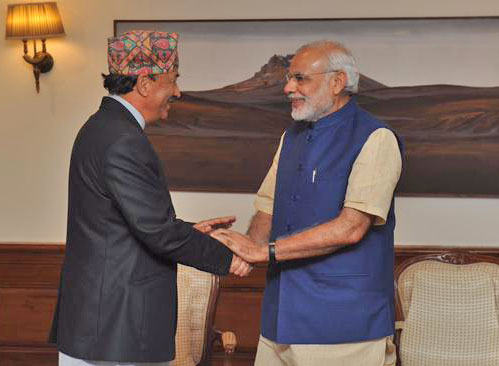Nepal-India revive bilateral engagement
Kathmandu, July 1
After a high-pitched diplomatic standoff between Nepal and India following the adoption of Nepal’s new constitution last year, the two countries have started mending ties, realising the importance of their “unparalleled relations”.
A series of meetings of bilateral working groups, including on security issues, boundary, trade and commerce, and water resources, were held in Kathmandu and New Delhi in recent weeks. More such talks at higher level are in the pipeline.
A meeting of Bilateral Consultative Group on Security Issues was held in New Delhi on June 9, while commerce secretary-level Inter-Governmental Committee meeting concluded in the Indian capital on Wednesday.
Likewise, the third Boundary Working Group met in Kathmandu last week. The security meet, which couldn’t be held last year due to the diplomatic standoff, has also decided to organise joint military drills in October-November.
Meanwhile, Eminent Persons Group on Nepal-India Relations which was set up to review all existing bilateral agreements since 1950s is convening its first ever meeting in Kathmandu next week. Both the sides are also trying to fix a date for foreign minister-level Joint Commission meeting soon, according to foreign ministry Spokesperson Bharat Raj Paudyal.
“Given the frequency of recent meetings, it seems the two neighbours want to set their differences aside and resume bilateral engagements,” said Nishchal Nath Pandey, director for Centre for South Asian Studies.
A foreign ministry official involved in some of the recent meetings with the Indian side told The Himalayan Times that both the sides have shed their egos in a bid to resolve differences.
“Unlike previous meetings, I have found softness in Indian side’s approach and presence,” the official added.
The relations between the two countries had ebbed when India not only refrained from welcoming Nepal’s new constitution, but also took it as an incomplete one. New Delhi suggested incorporating voices of all sections of Nepali society, including those of the protesting Madhesi-Janajati parties.
Ties between the two countries further soured when Madhesi parties blocked Nepal-India border for five months. It is learnt that the Indian side still holds its initial view on the constitution, but both the sides have agreed not to allow political issues affect other bilateral agendas.
The Indian side has yet to welcome the new charter.
However, it has acknowledged it in more positive light. In its recent report on diplomatic achievements of Prime Minister Narendra Modi’s two years in office, the Ministry of External Affairs of India has praised that ‘multiparty democracy has been consolidated in Nepal since the adoption of the new statute in September 2015.
It is also understood that both the sides are trying to reschedule and fix the date for President Bidhya Devi Bhandari’s visit to India, which was abruptly ‘postponed’ at the last minute in May. Deputy Prime Minister and Foreign Minister Kamal Thapa’s fifth visit to New Delhi on June 10 could be marked as breakthrough for resumption of bilateral engagement.
When he met with his Indian counterpart Sushma Swaraj, both the leaders emphasised on the importance of regular exchange of views at different levels in order to further strengthen bilateral relations between the two countries.
“Nepal’s relation with India is not comparable with any other bilateral relations,” Thapa had said in New Delhi.






